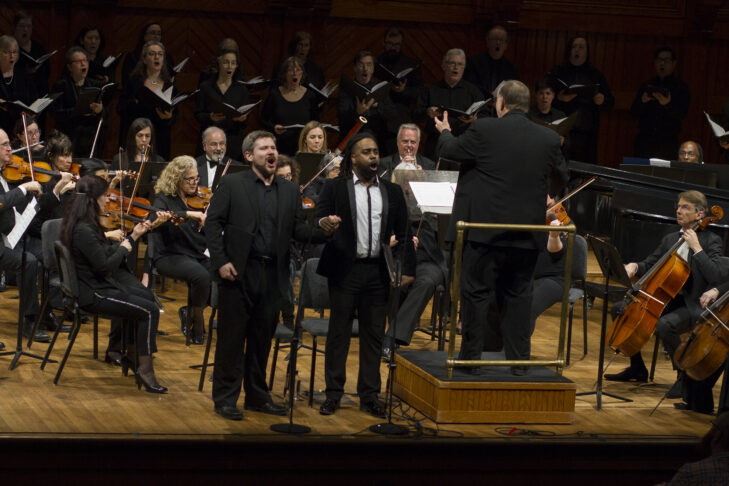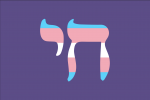On Sunday, Nov. 6, 2022, Coro Allegro, Boston’s LGBTQ+ and allied classical chorus, will present “Letters to Our Children: Voices Across Generations for LGBTQ+ Youth” at Old South Church in Boston’s Copley Square. It’s a venue that holds almost the entirety of American history beginning in 1669. The historian Ola Elizabeth Washington writes of the church: “Deep under the foundations of the Three Structures that have housed its thousands of worshippers lie whole chapters of American history and the slow emergence of certain Ideas & Principles upon which this nation is built—Liberty, Freedom of Conscience, Equality.”
Old South Church is now a venue extending the hand of friendship while advocating for “liberty, freedom of conscience and equality” for Boston’s LGBTQ+ community. The gesture comes at a time when over 300 state bills have been introduced or passed to remove protections for transgender and queer youth. In addition, it is a time when discussions about LGBTQ+ topics are beginning to be restricted in public schools. “Letters to Our Children,” which features the world premiere of “Here I Am: I Am Here” by American composer Andrea Clearfield, is based on poignant letters written by Mimi Lemay and Sam Brinton. Their words are set to beautiful, intricate music.
In 2015, Lemay wrote a letter to her transgender son, Jacob, on his fifth birthday, which was eventually published on Boston.com and went immediately viral. Lemay wrote that Jacob “set a stake in the ground and declared yourself a boy. … our home soon became a battleground over gender with you constantly pulling me, your dad, and your older sister into unwilling skirmishes. You would glare at us with your huge, defiant brown eyes and say, ‘I AM A BOY….’” The skirmishes died down in the years that followed, and Lemay and her son became well-known activists for transgender rights. In 2019, Lemay wrote a book about mothering her transgender son called “What We Will Become: A Mother, a Son, and a Journey of Transformation.”
Brinton is a nonbinary LGBTQ+ activist and survivor of conversion therapy. They penned a moving letter to their 12-year-old self about the abusive experience. Brinton’s activism has taken many forms—they are a former vice president of The Trevor Project, an LGBTQ+ organization dedicated to preventing youth suicide, and the founder of the 50 Bills 50 States campaign to end the harmful practice of conversion therapy. Brinton’s letter details how difficult it was for them to overcome their mother’s desperate, misplaced attempts to save her child. Brinton healed by acting as their own “fairy godmother as an adult.” In the letter, they tell their younger self, “There is nothing to change, and you are loved for exactly who you are.”
In May, Lemay, Brinton and Clearfield appeared in a pre-event program in advance of a performance of Clearfield’s cantata, “Here I Am: I Am Here.” Coro Allegro’s artistic director David Hodgkins introduced the program. He noted that “Here I Am: I Am Here” had been over five years in the making, and the goal had always been to commission a work by a woman composer. “However, we kept coming back to Mimi’s letter as the basis for the piece,” he said. “I later proposed pairing Mimi’s letter with Sam’s letter to their 12-year-old self about surviving conversion therapy. We loved Andrea’s work for the clear settings of texts and its ability to be complex and accessible music. We also wanted the Coro Allegro chorus to be challenged and the audience to be engaged.”
Both Lemay and Brinton pointed out that a 17-year-old transgender woman named Leelah Alcorn, a victim of conversion therapy who died by suicide, fueled their activism. Lemay remembers following the story and realizing that naming a person and telling their story was crucial in lifting them out of obscurity and honoring them. Lemay noted that after Alcorn’s death, “People started to have conversations about trans people and the kind of hardships they faced, including discrimination. I felt both great fear for my son but also a sense of responsibility because we had it relatively good in Massachusetts.”
Brinton noted that Alcorn left a suicide note imploring the world “to fix this problem.” “Leelah openly talked about having to experience the same thing I did, which was conversion therapy,” Brinton said. “It is assumed that Leelah attempted suicide and died by suicide following a conversion therapy session. That is why I wrote my letter. I am a survivor, and as I like to say, I thrive, but back then I survived.”
As Brinton praised Lemay for her courage and activism, they showed much empathy for their own mother’s confusion and misguided attempts to help Brinton. “It is hard for a person to hear some of my mother’s words toward me during the performance,” they said. “But if you put yourselves into my mother’s mindset, who loves her child so much that she’s told the only way to save their life is to put them through conversion therapy, you will understand the anguish she must have gone through when saying those words.”
Choosing the right words for her piece was important to Clearfield for her first libretto. “For me, the process began by creating an architecture in words and then finding the music. After that, I started to look for overlaps because Mimi and Sam’s stories are very different. There were overarching and archetypal themes, but I always look for the architecture in a piece. What is going to hold this piece together?”
Clearfield created a three-part structure in which she identified similar motifs in Lemay and Jay’s story and Sam’s story. She said the first four lines of the piece are its “DNA” and return throughout the cantata in different ways and with different meanings. The first lines Clearfield worked with are: “It started with a birth. I am here. And then I heard you: I am here.” Clearfield described those lines as “potent.” She added: “They each have a musical entity that encapsulates those words. And the words mean so many profound things. The music comes from those words.”
The third act comprises the “open letters” that Coro Allegro has been collecting for its “Letters Project: Voices Across Generations for LGBTQ+ Youth.” Yoshi Campbell, Coro Allegro’s executive director, said the project is ongoing and has invited the public to write their own open letters “to join a chorus of voices against the silencing messages queer youth and families with transgender children are hearing in places like Florida and Texas.” Campbell said the letters could be long or short. They can celebrate friends or give support to a stranger. “What matters is that we are speaking up for each other,” she said.
Add your letter for LGBTQ+ youth to the Letters Project.










